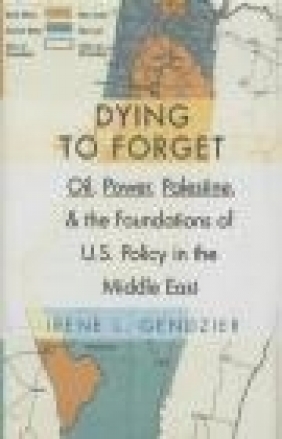Dying to Forget
Irene Gendzier
Dying to Forget
Irene Gendzier
- Producent: Columbia University Press
- Rok produkcji: 2015
- ISBN: 9780231152884
- Ilość stron: 432
- Oprawa: Twarda
Niedostępna
Opis: Dying to Forget - Irene Gendzier
Irene L. Gendzier presents incontrovertible evidence that oil politics played a significant role in the founding of Israel, the policy then adopted by the United States toward Palestinians, and subsequent U.S. involvement in the region. Consulting declassified U.S. government sources, as well as papers in the H.S. Truman Library, she uncovers little-known features of U.S. involvement in the region, including significant exchanges in the winter and spring of 1948 between the director of the Oil and Gas Division of the Interior Department and the representative of the Jewish Agency in the United States, months before Israel's independence and recognition by President Truman. Gendzier also shows that U.S. consuls and representatives abroad informed State Department officials, including the Secretary of State and the President, of the deleterious consequences of partition in Palestine. Yet the attempt to reconsider partition and replace it with a UN trusteeship for Palestine failed, jettisoned by Israel's declaration of independence. The results altered the regional balance of power and Washington's calculations of policy toward the new state. Prior to that, Gendzier reveals the U.S. endorsed the repatriation of Palestinian refugees in accord with UNGA Res 194 of Dec. 11, 1948, in addition to the resolution of territorial claims, the definition of boundaries, and the internationalization of Jerusalem. But U.S. interests in the Middle East, notably the protection of American oil interests, led U.S. officials to rethink Israel's military potential as a strategic ally. Washington then deferred to Israel with respect to the repatriation of Palestinian refugees, the question of boundaries, and the fate of Jerusalem-issues that U.S. officials have come to realize are central to the 1948 conflict and its aftermath. By tying together the strands of oil and strategic interests in Saudi Arabia with the familiar narrative about the American relationship with Zionism, this book is a major contribution to our understanding of crucial events for the future of the Middle East. Gendzier provides revelations and fresh insights throughout. -- Rashid Khalidi, Columbia University Drawing from a rich variety of sources, many previously untapped, Irene L. Gendzier provides a most valuable reinterpretation of the roots of U.S. policy towards Israel and the Palestinians. In particular, she shows convincingly that the crucial choice for planners was not 'oil versus Israel,' as commonly believed, but rather 'oil and Israel,' and demonstrates no less convincingly that the secrets of the past that she uncovers are intimately connected with 'the troubled present.' A very significant contribution. -- Noam Chomsky, Massachusetts Institute of Technology Present-day U.S. policy in the Middle East consists of contradictions wrapped in illusions propped up by hypocrisies. Gendzier traces those contradictions, illusions, and hypocrisies to a single point of origin: Washington's ill-fated response to the 'Palestine question' during the pivotal years from 1945 to 1949. Dying to Forget is comprehensive, illuminating, and, above all, compelling-revisionism in the best sense of the term. -- Andrew J. Bacevich, author of Washington Rules: America's Path to Permanent War In this fascinating, illuminating, and authoritative reconstruction of the complex evolution of U.S. policy toward the emergence of Israel, Gendzier tells a gripping story that displays extraordinary narrative skills as well as exhibiting her mastery of an astonishing range of scholarly materials. Although primarily a brilliant contribution to diplomatic history, this work is relevant to our understanding of the crucial interplay between Israeli diplomacy and oil geopolitics in the Middle East. -- Richard A. Falk, Princeton University A Middle East scholar uncovers the post-World War II history of American policy in Palestine. From the beginning, it's been about oil... compiling an almost bulletproof brief. Vital reading for those looking to understand, 65 years later, the origins of the continuing conflict in the Middle East. Kirkus Reviews Gendzier's thorough but dense account, best suited to the serious student of Middle East policy, is essential to any sophisticated understanding of the Israeli-Palestinian conflict. Publishers WeeklyAcknowledgmentsIntroduction: Open SecretsPart I: The Postwar Petroleum Order and the Palestine Question, 1945-19461. The Primacy of Oil2. The Palestine Question: 1945Part II: The Question of Partition and the Oil Connection, 1947-19483. The Critical Year: 19474. The Winter of Discontent: 19485. The Oil ConnectionPart III: Beware "Anomalous Situations," 19486. The Transformation of Palestine7. Truce and Trusteeship8. Recognition and ResponsePart IV: Rethinking U.S. Policy in Palestine/Israel, 19489. Reconsidering U.S. Policy in Palestine10. The Palestine Refugee Problem11. The State Department on the RecordPart V: The End as the Beginning, 1948-4912. The PCC, Armistice, Lausanne, and Palestinian Refugees13. The View from the Pentagon and the National Security Council14. The Israeli-U.S. Oil Connection and Expanding U.S. Oil InterestsPart VI: In Place of a ConclusionReflections on Discovery, Denial, and DeferralNotesIndex
Szczegóły: Dying to Forget - Irene Gendzier
Tytuł: Dying to Forget
Autor: Irene Gendzier
Producent: Columbia University Press
ISBN: 9780231152884
Rok produkcji: 2015
Ilość stron: 432
Oprawa: Twarda
Waga: 0.45 kg























